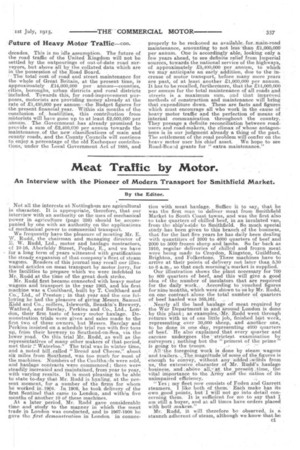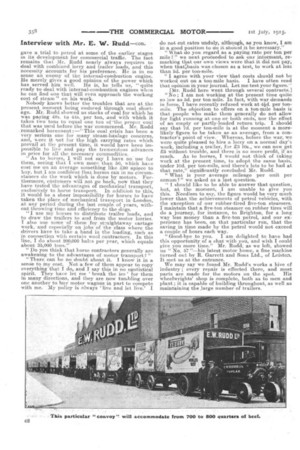Meat Traffic by Motor.
Page 3

Page 4

If you've noticed an error in this article please click here to report it so we can fix it.
An Interview with the Pioneer of Modern Transport for Smithfield Niarket.
By the Editor.
• Not all the interests at Nottingham are agricultural in character. It is appropriate, therefore, that our interview with an authority on the uses of mechanical power in agriculture (page 359) should be accompanied by one with an authority on the applications of mechanical power to commercial transport. We frequently have the pleasure of meeting Mr. E. W. Rudd, the chairman and managing director of E. W. Rudd, Ltd., motor and haulage contractors, of 10-16, Aberfeldy Street, Poplar, E., and we have for .a long term of years witnessed with gratification the steady expansion of that company's fleet of steam wagons. Readers of this journal may recall our illustrated articles on meat transport by motor lorry, for the facilities to prepare which we were indebted to Mr. Rudd at the time of the great dock strike,
Mr. Rudd first became connected with heavy motor wagons and transport in the year 1903, and hl a first machine was a Coultbard, built by T. CouIthard and C0: Ltd., of Preston ; in that year and the one following he had the pleasure of giving Messrs. Samuel Kidd and Co., millers, Isleworth, Benskin'•s Brewery, Watford, an Barclay, Perkins and Co., Ltd., London, their first taste of heavy motor haulage. Demonstration trials were given and sales made to the first two of these owners,. but Messrs. Barclay and Perkins insisted on a schedule trial run with five tons up, from their brewerY to Southend-on-Sea, via the lower road. On this trial Mr. Rudd, as well as the representatives of many other makers of that period, met their !,` Waterloo." The trial was in winter time, and a noted hill. called "Breed and Cheese," about six miles from Southend, was too much for most of the machines. Numbers of the Coultha.ils were sold, and haulage contracts were commenced ; these were steadily. inereaSeal and Maintained, from year to year, with varying results. It is most pleasing to be able to state today that Mr. Rudd is hauling, at the present moment, for a number of the firms for whom he worked in,1904.• In 1906, he took delivery of the first Sentinel that came to London, and within five months of another 10 of these machines.
At a later period, Mr. Rudd gave considerable time and study to the manner in which the meat trade in London was conducted, and in 1907-1908 he gave the first demonstration in London in connec
tion with meat haulage. Suffice it to say, that he was the first man to deliver meat from Smithfield Market to South Coast towns, and was the first also to take quarters of chilled beef, in an insulated van, from. the ship's-side to Smithfield. So much special study.has been given to this branch of the business, that for the last five years he has daily been dealing with quantities of 2000 to 4000 quarters of beef and 2000 to 5000 frozen sheep and lambs. So far back as 1910, regular deliveries of chilled and frozen meat were being made to Croydon, Kingston, Guildford, Brighton, and Folkestone. These machines have to arrive at their points of delivery not later than 5.30 to 6 a.m., so that each morning's market is supplied.
Our illustration shows the plant necessary for 700 to 800 quarters of beef, and this will give a good idea of the number of insulators that are required for the daily work.: According to .vouched figures for nine Months, which were shbwn to us by Mr. Rudd, on one contract alone the total number of quarters of beef hauled was 265,161. , Nearly all the land haulage of meat required by the War Department in and 'around London is done by this plant; as examples, .Mr. Rudd went through returns with us of one little job, finished laSt weak, representing over 30,000 sheep, and another one, to be done in one day, representing 4000 quarters of beef.' He also explained that every quarter and carcase undergoes thestrictest examination by surveyors; nothing but the " primest of the prime" is going to the troops. All 'the foregoing work is done by steam. wagons and .trailera. aThe.inagnitude 'Of some of the figures is enough to convey, without any 'added -,weirds from us,' the extensive character of Mr. Rudd's haulage business, and :,above all,a-at the present ,time, the
vital inipbrtance to the and the nation of its unimpaired efficiency.
"Yes ; my fleet now consists of Foden and Garrett steamers. I like both of .them:. Each make has its own _good .points, but'I will not go into detail concerning them. It is sufficient for me to say that I am still a buyer, and at all times have orders placed with botl. froakeas."
Mr. Rudd, it will therefore be observed, is a staunch adherent of steam, although we know that he 01 gave a trial to petrol at some of. the earlier stages in its development for commercial traffic. The fact remains that Mr. Rudd nearly always requires to deal with combined lorry and trailer loads, and this necessity accounts for his preference. He is in no sense an enemy of the internal-combustion engine. He Merely gives a good opinion of the power which has served him well. Ile is, he tells us, "quite ready to deal with internal-combustion engines when he can find one that will even approach the working cost of steam" on his work.
Nobody knows better the troubles that are at the present moment being endured through coal shortage. Mr: Rudd showed us stacks of coal for which he was paying 42s. to 44s. per ton, and with which it takes two tons to equal one ton of 'the proper coal that was used before the war commenced. Mr. Rudd . remarked herea.nent :—" This coal crisis has been a very serious one for man Y steam-haulage concerns, and, v. ere it not for the high carrying rates which prevail at the present time, it would have been impossible to live and pay the tremendous advances in price for all the necessary commodities. " As to horses, I will not say I have no use for them, seeing that Lown more than 50, which have cost me on an average something like ±;90 apiece to buy. but I am confident. that horses can in no circumstances do the work which is done by motors. Furthermore, customers will not _go back, nothat they have tested the advantages of mechanical transport, exclusively to horse transport. In addition to this, it would be a sheer impossibility for horses to have taken the place of mechanical transport in -London, at any period during the last couple of years, without throwing time and efficiency to the dogs. "I use my horses to distribute trailer loads, and to draw. the trailers to and from the motor lorries.
also use -some of them for stnaightaway cartage work, • and-cspeeially on jobs of 'the class where the drivers have to take a hand in the loading, such as in connection with certain wool contractors. In this line, I do about 200,000 bales per year, which equals about 35,000 tons."'
" Do you think that horse contractors generally are awakening to the advantages of motor transport?"
"There can be no doubt about it. I know it in a serie to ,my cost. Not sifew of them appear to copy everything that -I de,and Ti say this in no egotistical spirit. They have let Me break the ice' for them in many directions, and they are now tumbling over one another to my motor wagons in part to compete with me. My policy is Always 'live and let live. I
do not cut rates unduly, although, as you know, I arft in a good position to do it should it be necessary."
"What do you regard as a paying-rate per ton per mile T 7 we next proCeeded to .ask our informant, remarking that our own views were that it did not pay, when thaecbanis was.chosen as a test, to work at less than 5d. per ton-mile.
" I agree with your view that costs should not be worked out on a ton-mile basis. I have often read that opinion in your journal. Let me test your figure.'' [tr. Rudd here went through several contract.]
"No ; I am not working at the present time quite so low as 5d. per ton-mile. In fact, with war demands in force, I have recently refused work at (lid. per tonmile. The objection to offers on a ton-mile basis is that people who make them generally do not allow for light running at one or both ends, nor the effect of an empty or partly-loaded return trip. I should say that 7d. per ton-mile is at the moment a more likely figure to be taken as an average, from a eon,tractor's pOint of view. Whereas, before the war, we were quite pleased to hire a bury on a normal day's work, including a trailer, for 23 10s., we can now get £5 without trouble, and there is no more profit, if as much. As to horses, I would not think of taking work at the present time, to adopt the same basis, under led, per ton-mile, and there's lots to be had at that rate," significantly concluded Mr. Rudd.
"What is your average mileage per unit per annum ?" we asked as a last question.
"I should like to be able to answer that question, but, at the moment, I am unable to give you this. Needless to say, the figure would be very much lower than the achievements of petrol vehicles, with the exception of our rubber-tired five-ton steamers. I maintain that a five-ton steamer on rubber tires will do a journey, for instance, to Brighton, for a long way less money than a five-ton petrol, and our experience has been, on that particular run, that the saying in time made by the petrol would not exceed a couple of hours each way.
"Good-bye to you. I am delighted to have had this opportunity of a chat with you, and wish I could give you more time." Mr. Rudd; as we left, showed " No. 5-7 "—his latest motor home, a fine machine turned out by R. Garrett and Sons Ltd., of Leiston. It met us at the entrance.
We may say we found Mr. Rudd's works a hive of industry ; every repair is greeted there, and most parts are made for the motors on the spot. His wheelwrights' shop is complete, both as to men and plant ; it is capable of building throughout, as well as maintaining the jarge number of trailers.


































